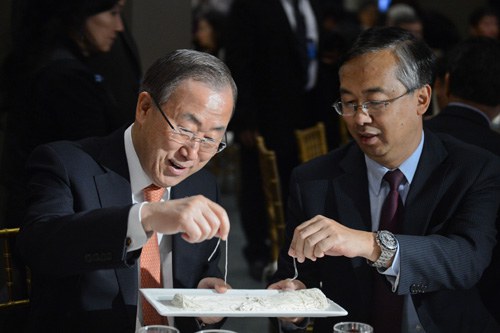|
 |
|
FOOD ART: UN Secretary General Ban Ki-moon (left) has a look at some Longxu Mian, a traditional Chinese noodle, during a promotional event for Chinese cuisine at the UN headquarters in New York on November 12 (NIU XIAOLEI) |
Vehicle Regulations
Vehicle safety checks will be carried out as part of a "zero tolerance" campaign, the Ministry of Public Security (MPS) announced on November 12.
The campaign, which began on November 12 and will last until February 2014, will focus on illegally refitted or assembled vehicles, particularly school buses, passenger vehicles and transportation for dangerous freight, according to a circular jointly released by six ministerial agencies, including the MPS.
Companies that violate the regulations could face a range of penalties including forced suspension of production, confiscation of illegal products, and the revoking of production or business licenses, according to the circular.
Agencies that conduct safety tests on vehicles may also lose their licenses if they issue inspection reports based on insufficient or fraudulent information.
The campaign was launched after several cases of the illegal
refurbishing and selling of scrapped vehicles in Jiangxi, Hebei and Anhui provinces, posing significant safety risks.
Radiation Watch
Radioactive substances are at a normal level in west Pacific waters, China's State Oceanic Administration said on November 11.
The administration found no traces of Cesium-134 in waters near the country's southeastern Fujian and Taiwan provinces. Cesium-137 was also found to be at a normal level in the same waters.
The administration stated that it began the monitoring work on October 20 in reaction to Japan's continued discharge of large quantities of radioactively contaminated water into the sea in the wake of the Fukushima nuclear disaster in 2011. There are concerns that these actions are seriously impacting the maritime eco-system.
As of November 8, the administration had completed 20 days of monitoring in the waters near Fujian and the south of Taiwan, collecting over 1,150 samples including air, water, marine creatures and ocean sediments.
SMS Spam
More than 200 billion text messages disturbed the Chinese nation in the first half of 2013, according a recent report.
The report, issued by a platform that was established by Beijing-based websites dedicated to refuting rumors, analyzed almost 100 million unsolicited messages, finding 59 percent of them to be advertisements.
In the first six months of this year, messages aimed at scamming or tricking the receivers, which accounted for only 1.5 percent of the total, led to over 30 million yuan ($4.93 million) in losses. The southern province of Guangdong was discovered to be the primary source of junk messages, with 25 percent originating from there. The culprit landing the second place spot was Beijing, followed by the provinces of Hunan, Zhejiang and Shaanxi. The residents of Beijing, Shanghai, Guangzhou in Guangdong and other economically developed regions are most heavily hit, with an average at more than two spam messages per phone user per day.
Cloud Computing
A cloud computing industry alliance was set up on November 13 in Beijing to promote the development and innovation of information technology.
The alliance, the first of its kind in China, was established by Tsinghua University, Peking University and the Center for International Economic and Technological Cooperation under the Ministry of Industry and Information Technology.
The pact aims to introduce advanced ideas, technologies and study the experiences of cloud computing services overseas in order to boost the industry in China, according to a statement.
The alliance will also boost domestic and international cooperation in cloud computing by integrating resources from the government, enterprises, universities, research institutes and capital market, the statement said. | 